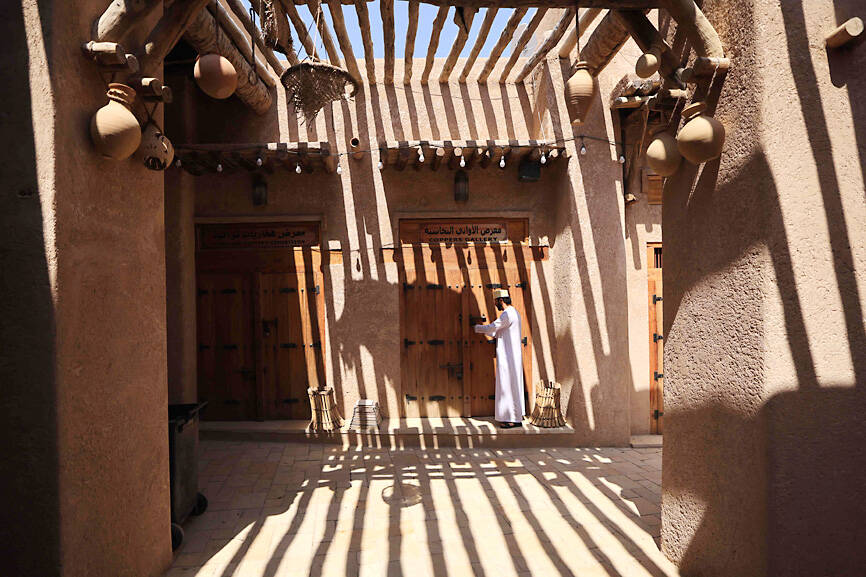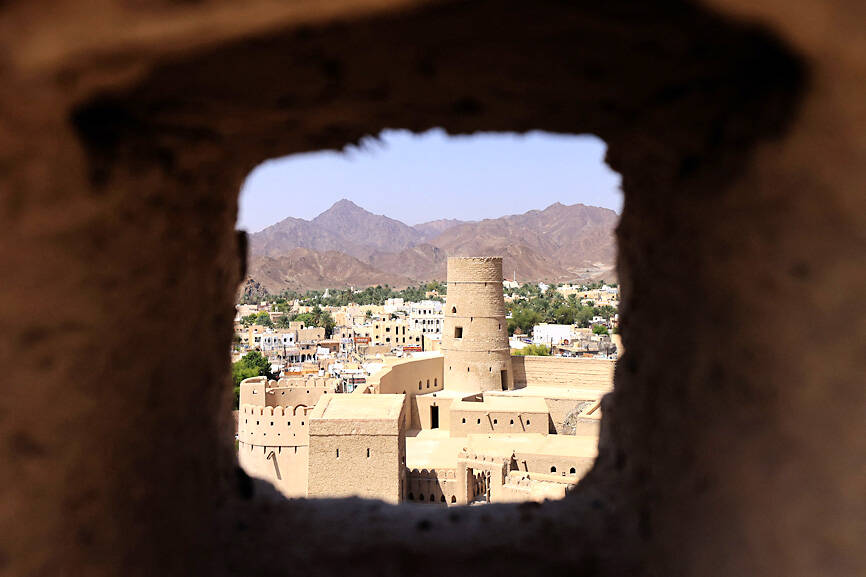Deep in Oman’s parched interior, the ancient oasis town of Bahla abounds with myths of camel-eating, fire-mouthed hyenas and men turning into donkeys — a reputation for magic and mystery that persists to this day. Some superstitious Omanis shun the isolated desert settlement because of its stories of jinn, the spirits that have been part of Arab folklore since before the dawn of Islam.
Bahla, a quiet town of palm groves and eerie, abandoned mud-brick homes, lies about 200km southwest of the capital, Muscat, in Ad Dakhiliyah Governorate, with an imposing double-archway at its entrance.
Here, in one of Oman’s oldest inhabited settlements, belief is firm in jinn, which are described as supernatural beings distinct from humans and angels that live alongside mankind.

Photo: AFP
“We believe that jinn are among the creations of God ... so it is not strange,” said tour guide Hamad al-Rabaani at Bahla’s medieval fort, a UNESCO World Heritage Site.
Magical stories permeate Bahla, including the popular myth that supernatural forces built the 13km wall around the town in a single night, to protect it from invaders.
“The legend is of two sisters, both jinn, one of whom built the wall for protection ... and the other who created an ancient irrigation system for agriculture,” Rabaani, 55, said.

Photo: AFP
The concept of jinn predates Islam, but descriptions of the spirits feature in Islamic texts, which declare them subjects of God.
Few places are as strongly linked with jinn as Bahla, where “you hear stories of men who suddenly transform into donkeys and other animals,” Rabaani said.
One old woman often used to hear someone milking her cow after midnight, but whenever she went to check, she found no one there, he said.
“You hear, but you never see, because your mind couldn’t take it,” he added.
In Bahla’s old market, as silence descends after midday prayers, some residents are uneasy discussing the town’s reputation for spirits, fearing it might tarnish its image.
Mohammed al-Hashemi, a Bahla native in his 70s, said most of his life has been shaped by supernatural beliefs.
As a child he was told stories of hyenas hungry for camels and with mouths of flames that roamed the desert at night.
“They used to warn us not to go out after sunset because of magic,” he said in an air-conditioned supermarket.
Oral folklore and certain ancient texts say jinn are common in the Arabian Peninsula’s far reaches, said Ali Olomi, a professor of Islamic history at Loyola Marymount University in Los Angeles.
Oman and neighboring Yemen, the peninsula’s southernmost countries, “both earn a reputation as not only ancient places with great historical significance, but as lands of the jinn,” he said.
“In Bahla, there are stories of phantom blazes and fires, animated desert storms and even edifices built by supernatural forces,” said Olomi, who specializes in Islamic esotericism and astrology.
Part of the reason Bahla is rife with such stories is that it was a remote outpost in ancient times, surrounded by desert and the dramatic Hajar mountains.
“The presence of jinn in places like Bahla can tell us a great deal about the history and culture of the Arabian Peninsula,” Olomi said. “This is a history of a people living in far-off settlements, linked precariously to other human settlements, and who keenly feel the presence of nature all around them.”
Among younger Omanis, not everyone is convinced about jinn, including Mazen al-Khaterri, a 24-year-old math teacher in Bahla.
“These are just stories told by our grandparents,” he said at a cafe in the old market. “We don’t know if they are right or wrong.”
However, Hasan, a 30-year-old who lives in Muscat, said suspicions of Bahla remain commonplace all the same.
“My family would never let me go,” he said, asking to use only his first name to protect his privacy. “The rumors say it is a city of jinn, where they live and have more freedom.”

MONEY GRAB: People were rushing to collect bills scattered on the ground after the plane transporting money crashed, which an official said hindered rescue efforts A cargo plane carrying money on Friday crashed near Bolivia’s capital, damaging about a dozen vehicles on highway, scattering bills on the ground and leaving at least 15 people dead and others injured, an official said. Bolivian Minister of Defense Marcelo Salinas said the Hercules C-130 plane was transporting newly printed Bolivian currency when it “landed and veered off the runway” at an airport in El Alto, a city adjacent to La Paz, before ending up in a nearby field. Firefighters managed to put out the flames that engulfed the aircraft. Fire chief Pavel Tovar said at least 15 people died, but

LIKE FATHER, LIKE DAUGHTER: By showing Ju-ae’s ability to handle a weapon, the photos ‘suggest she is indeed receiving training as a successor,’ an academic said North Korea on Saturday released a rare image of leader Kim Jong-un’s teenage daughter firing a rifle at a shooting range, adding to speculation that she is being groomed as his successor. Kim’s daughter, Ju-ae, has long been seen as the next in line to rule the secretive, nuclear-armed state, and took part in a string of recent high-profile outings, including last week’s military parade marking the closing stages of North Korea’s key party congress. Pyongyang’s official Korean Central News Agency (KCNA) released a photo of Ju-ae shooting a rifle at an outdoor shooting range, peering through a rifle scope

South Korea would soon no longer be one of the few countries where Google Maps does not work properly, after its security-conscious government reversed a two-decade stance to approve the export of high-precision map data to overseas servers. The approval was made “on the condition that strict security requirements are met,” the South Korean Ministry of Land, Infrastructure and Transport said. Those conditions include blurring military and other sensitive security-related facilities, as well as restricting longitude and latitude coordinates for South Korean territory on products such as Google Maps and Google Earth, it said. The decision is expected to hurt Naver and Kakao

Australian Prime Minister Anthony Albanese yesterday said he did not take his security for granted, after he was evacuated from his residence for several hours following a bomb threat sent to a Chinese dance group. Albanese was evacuated from his Canberra residence late on Tuesday following the threat, and returned a few hours later after nothing suspicious was found. The bomb scare was among several e-mails threatening Albanese sent to a representative of Shen Yun, a classical Chinese dance troupe banned in China that is due to perform in Australia this month, a spokesperson for the group said in a statement. The e-mail